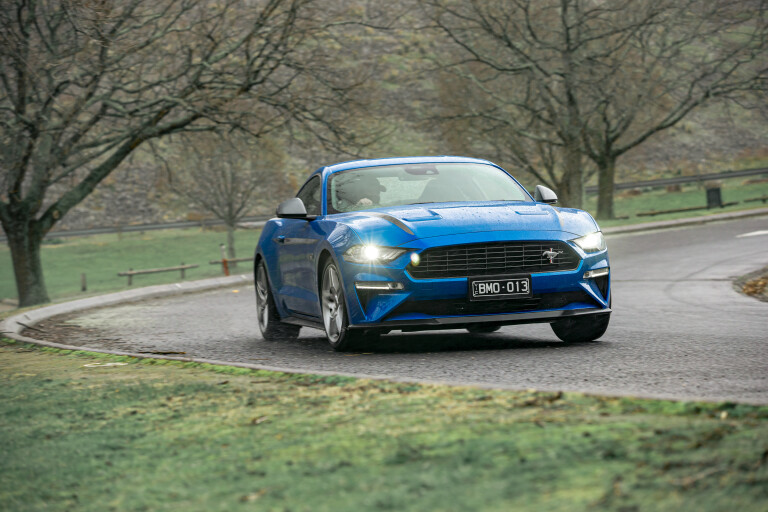
Things we like
- Style in spades
- Frugal sipper
- Lighter front end
Not so much
- Lacks aural theatre
- Getting expensive
- Heavy
It was an innocuous enough question from a colleague that got me thinking.
“Do you think the Mustang is starting to look a bit dated now?” he asked.
It wasn’t something I’d considered before, but it spurred a confronting realisation that the hugely popular Ford Mustang, in its current form, has been on sale for almost six years now.
In those six years, the Mustang has enjoyed a consistent chart-topping position and comfortably owns its segment through sheer volume. It’s the V8 GT, however, that makes up most of those units while the oft-forgotten four-cylinder is left to live in the shadow of its more popular stablemate.
With younger and smarter competitors in the paddock, how does the frugal fastback stack up today?
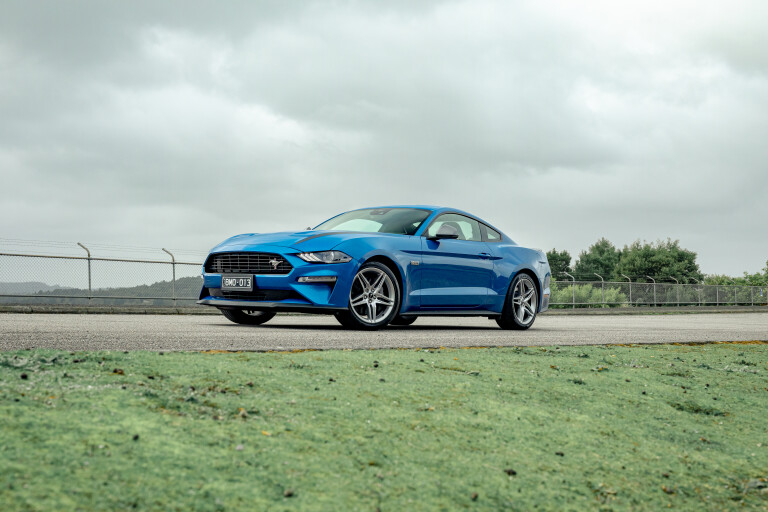
It still looks fresh to my eyes, especially so when finished in Ford’s striking Velocity Blue paint. Among a significant midlife update in 2018, Ford took the opportunity to further distinguish the four-cylinder Mustang from the range by bestowing it with a unique horizontal grille design, bonnet spear stripes, as well as bespoke badging on all sides – and inside, too. Ford also swapped the uninspiring ‘Ecoboost’ name for a more imposing ‘2.3 High Performance’ moniker.
At $54,690, the 2.3 HP coupe with the 10-speed automatic gearbox is your second-cheapest entry point into the popular pony car range. You can save $3000 by opting for the six-speed manual, or spend another $6300 for the convertible, but this is the popular pick of the four-bangers.
That’s a noticeable price creep from the old Ecoboost’s initial offering of $45,990 back in 2016, however you are getting a vastly improved vehicle.
A generous standard equipment list includes 19-inch allows, active exhaust, auto LED front and rear lights, rain sensing wipers, 390-watt 12-speaker B&O stereo, eight-inch central infotainment screen, Apple CarPlay and Android Auto, SatNav, 12-inch digital instrument cluster, reverse camera, keyless entry, heated and ventilated six-way power seats, leather trim, dual-zone HVAC and ambient lighting.
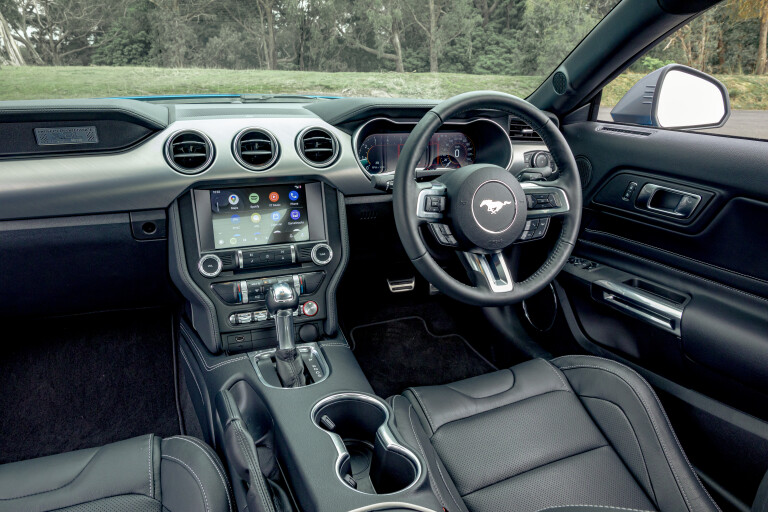
Our test car comes further optioned with MagneRide adaptive dampers and Recaro sports seats.
A range of Ford’s active safety features are also fitted as standard, including adaptive cruise control, autonomous emergency braking, lane-departure warning and lane-keep assist.
Every new Mustang is covered by Ford’s five-year/unlimited-km warranty, and will be called in for servicing every 15,000kms or 12 months. Ford also offers a $299 ‘special price’ servicing program valid for up to four years or 60,000kms.
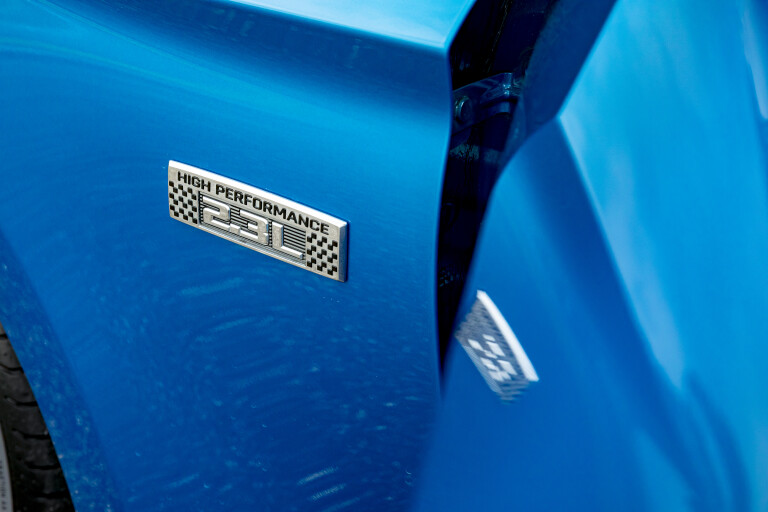
Now, you may hold your own prejudices towards a four-cylinder Mustang, but 236kW/448Nm is a pretty respectable amount of grunt for this pricepoint. The 2.3-litre mill is an evolution of the 224kW unit found in the previous generation Focus’ RS variant, albeit with a lower compression ratio and larger turbocharger yielding a wider power band.
It’s a very tractable and responsive powerplant and feels fast in the urban setting. Low- and mid-range delivery is where the four-pot best flexes its muscles and, despite the headline 448Nm figure being delivered at 3800rpm, a minimum of 400Nm is on tap anywhere between 2500-5300rpm. Power continues to build until a 6200rpm peak, before redline is indicated at 6500rpm.
Its buzzsaw-like soundtrack is uninspired, and certainly won’t hold a candle to the soul-stirring bellow of the naturally aspirated 5.0-litre Coyote V8, but you do get some entertaining pops on overrun and there’s some noticeable induction noise. In isolation, however, it’s an effective unit.
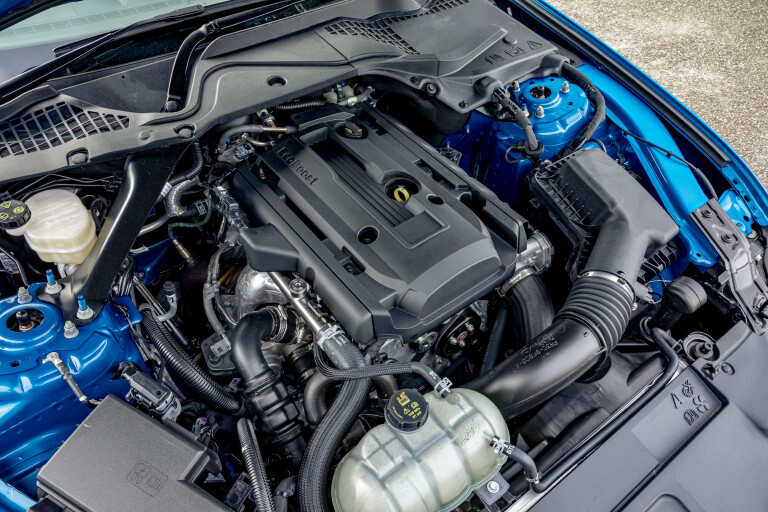
Especially when matched with the popular 10-speed automatic. The tightly-stacked ratios and intuitive logic will see the Mustang happily sip away at its fuel reserves on a cruise, returning 9.09L/100km on our test cycle. Conversely, it will fire off downshifts as needed under hard braking when on a gallop. Effective at its extremes however, the transmission can trip over itself with so many ratios to juggle when on a fast cruise at six-to-eight-tenths.
In many ways, the Mustang 2.3 HP is a more satisfying car to drive fast than its vaunted V8 counterpart. Carrying half the cylinders, the four-pot engine weighs almost half that of the big bent-eight and delivers a discernibly lighter and more direct front end. In comparison, the V8 GT is lumbering in its heft while the 2.3 HP feels delightfully light. If you do happen to miss that steering heft, you can dial some of it back in with Sport and Sport Plus modes.
The Mustang becomes a bit more aloof as you approach the limit. Despite the lighter engine up front, the 2.3 HP still tips the scales at 1716kg which can be hard for the square set 255/40/19 Pirelli P Zeroes tyres to contain at speed.
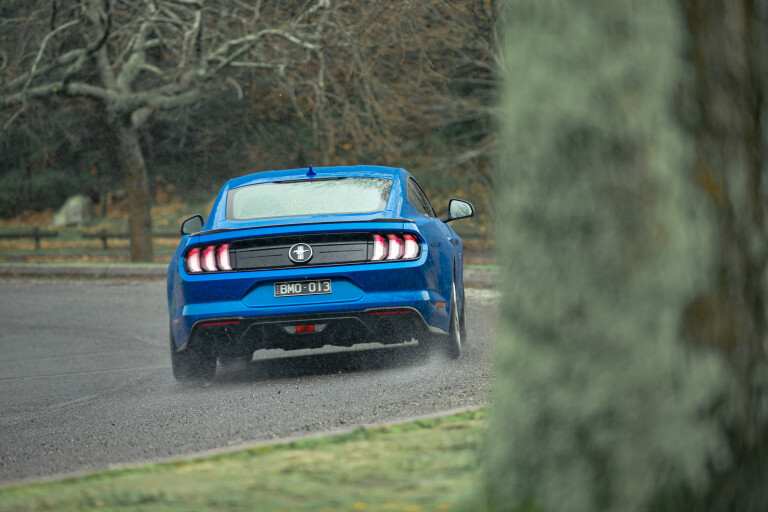
It may be one of the Mustang’s entry-level offerings, but interior ambience still feels premium with lots of leather and tech. It may not match the presentation of younger and more tech-laden rivals, but the cabin deftly executes a fine balance of modern systems and easy to use controls.
There’s no chance of getting lost in a sub-menu on your way to changing your climate settings, and there’s little you could feasibly be left wanting for today – okay, maybe a wireless phone charger. The optional Recaro sports seats look great, and offer more lateral support than the standard units, but come at the expense of standard heating and cooling functions and can be too small for some people.
If you remember, the original Ecoboost Mustang was visually almost indistinguishable from its V8 stablemate. Today though, the 2.3 HP emerges as a complete package and more confident in its skin than ever.
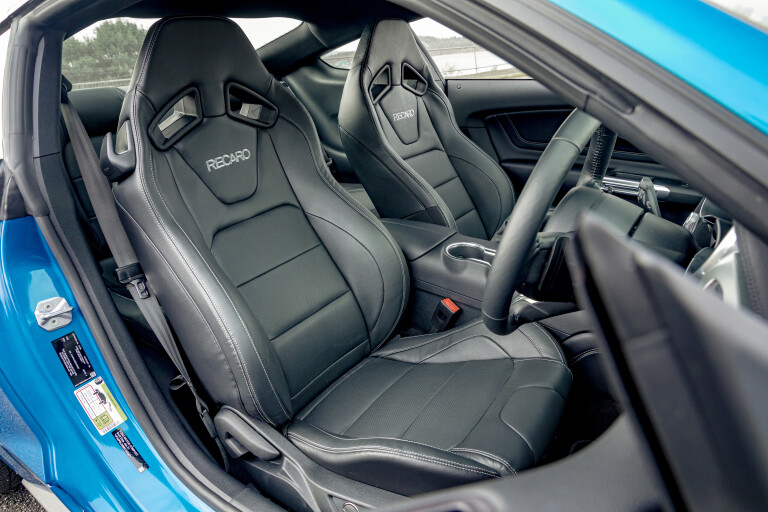
Yet, upon reflection, its hard to imagine who the car is meant for when you consider that $54,690 for the entry-level auto also affords you some sublime hot hatches. On the other hand, the four-cylinder Mustang offers a significant $9700 saving over the V8-powered GT.
It may pack half the cylinders, but it would be truly unfair to call it half the car. If you can relinquish your four-pot prejudices, the Mustang 2.3 HP emerges as an entertaining, stylish and cohesive coupe that you may find has a charm all its own.
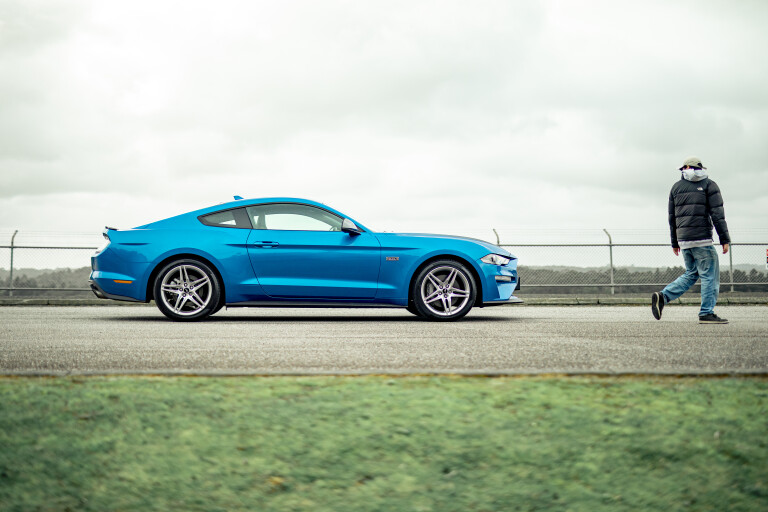
2021 Ford Mustang 2.3 High Performance specs
| Body: | 2-door, 4-seat coupe |
|---|---|
| Drive: | rear-wheel |
| Engine: | 2261cc I4, DOHC, 16v |
| Bore x Stroke: | 93 x 92.7mm |
| Compression: | 12.0:1 |
| Power: | 236kW @ 6200rpm |
| Torque: | 448Nm @ 3800rpm |
| Power/Weight: | 137.5kW/tonne |
| Transmission: | 10-speed automatic |
| Weight: | 1716kg |
| Suspension: | struts, coil springs, adaptive dampers, anti-roll bar (f); multi-links, coil springs, adaptive dampers, anti-roll bar (r) |
| L/W/H: | 4789/1916/1396mm |
| Wheelbase: | 2720mm |
| Tracks: | 1642mm (f/r) |
| Steering: | electrically assisted rack-and-pinion |
| Brakes: | 352mm ventilated discs, 4-piston calipers (f); 330mm ventilated discs, single-piston calipers (r) |
| Wheels: | 19 x 9.0-inch (f) |
| Tyres: | 255/40 R19 (f/r) Pirelli P Zero |
| Price: | $54,690 |
Things we like
- Style in spades
- Frugal sipper
- Lighter front end
Not so much
- Lacks aural theatre
- Getting expensive
- Heavy



COMMENTS